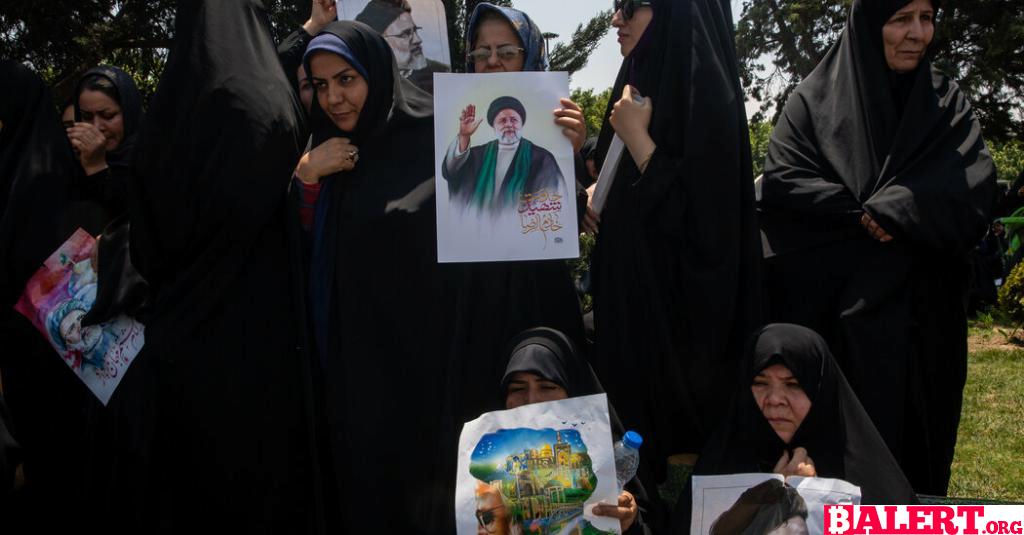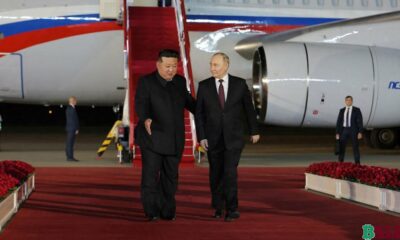World
Investigation Uncovers Causes of Helicopter Crash That Killed Iranian President
Explore the findings of a comprehensive investigation that reveals the causes behind the tragic helicopter crash that claimed the life of the Iranian President. Discover key insights and implications for aviation safety in this critical analysis.

Investigation Reveals Causes Behind Helicopter Crash in Iran
The tragic helicopter crash that claimed the life of Iran’s president in May has been attributed primarily to adverse weather conditions, including heavy fog, according to a final investigation report released by Iranian state media. President Ebrahim Raisi, a hard-line cleric and a close ally of Iran’s supreme leader, Ayatollah Ali Khamenei, was killed in an incident that reverberated throughout the nation, particularly during a time of heightened tensions with Israel, economic challenges, and complex negotiations surrounding Iran’s nuclear ambitions.
Initially, the state news agency IRNA reported in June that “technical failure” may have played a role in the disaster. However, the latest findings from an investigation conducted by Iran’s armed forces concluded that “the accident was primarily caused by weather conditions, including thick fog.” The report indicated that “all major repairs and replacement of critical parts” for the helicopter had been performed in accordance with established regulations, and an examination of the wreckage revealed “no defects” that could have contributed to the accident. Furthermore, the report found “no signs of sabotage or tampering,” reinforcing the notion that the crash was a tragic accident rather than a deliberate act.
On the day of the incident, President Raisi, along with the influential Foreign Minister Hossein Amir Abdollahian and other key officials, was returning in a convoy of three helicopters from an event in Azerbaijan. Shortly after takeoff, around 1 p.m., the helicopters encountered a dense fog while flying over a mountainous area near Iran’s northern border. When the lead helicopter emerged from the fog, crew members realized they had lost communication with the president’s helicopter, which failed to respond to radio calls. Transportation Minister Mehrdad Bazrpash later recounted the frantic search that ensued through challenging weather conditions, including rain and fog, as rescuers scoured the forests for the missing helicopter.
The wreckage was eventually located, but unfortunately, there were no survivors at the crash site. Reports indicated that the helicopter had exploded upon impact, and an initial investigation conducted by Iran’s Armed Forces revealed no evidence of foul play or gunfire on the aircraft. Despite this, some officials raised questions about whether appropriate security protocols were followed, particularly regarding the decision to fly the president in such poor weather conditions.
In addition to President Raisi and Foreign Minister Abdollahian, the helicopter was also carrying several notable figures, including Ayatollah Mohammad-Ali Al-Hashem, an imam from Tabriz; Malek Rahmati, the governor of East Azerbaijan Province; and Gen. Seyed Mehdi Mousavi, the chief of presidential security from the Revolutionary Guards Corps, which serves as Iran’s equivalent of the Secret Service.
While many Iranians mourned the loss of President Raisi, others viewed his passing as a significant moment, marking the end of a leader associated with a regime they perceived as corrupt. Raisi’s tenure was marked by the execution of dissidents, violent suppression of protests, and the arrest of journalists and activists. His death at the age of 63 led to a special election, which was ultimately won by a reformist candidate advocating for moderate policies and improved relations with Western nations.
World
Dominique Pelicot Testifies in Harrowing Rape Trial
Join us as Dominique Pelicot courageously testifies in a harrowing rape trial, shedding light on the complexities of trauma and justice. Her powerful story raises crucial questions about the legal system and the importance of support for survivors.

Dominique Pelicot Takes the Stand in Shocking Rape Trial
In a courtroom drama that has captivated France and garnered international attention, Dominique Pelicot, the man at the center of a harrowing rape trial, finally addressed the court. With tears streaming down his face, he recounted how his wife had been instrumental in helping him cope with a tumultuous past marked by trauma. He revealed that he had endured a sexual assault at the tender age of nine while hospitalized, and he also witnessed a gang rape during his teenage years while working as an apprentice electrician on a construction site.
“She didn’t deserve this, I acknowledge that,” Mr. Pelicot stated, his voice barely audible as he struggled to convey his emotions. The gravity of the situation weighed heavily on him, and the courtroom fell silent, straining to catch his every word.
Now 71 years old, Mr. Pelicot faces serious allegations of drugging his wife, Gisèle Pelicot, whom he has been married to for half a century, over a span of nearly ten years. Prosecutors contend that he used drugs to render her comatose, allowing him to rape her repeatedly. Furthermore, authorities allege that he went so far as to invite numerous men into their home, facilitating a nightmarish scenario where they, too, engaged in the assault of his wife.
Overall, 51 men, including Mr. Pelicot, are on trial concurrently, primarily facing charges related to the aggravated rape of Ms. Pelicot. Among them, one individual has already pleaded guilty to similar crimes, admitting to drugging his own wife to assault her and inviting Mr. Pelicot to partake in the horrific act while she was incapacitated.
Mr. Pelicot’s unexpected testimony came after a tumultuous start to the trial. Just a week in, he was stricken with severe health issues that forced him to miss four consecutive days in court. The head judge ultimately decided to postpone proceedings, as Mr. Pelicot was diagnosed with kidney stones, a kidney infection, and prostate complications, adding yet another layer of complexity to this already harrowing case.
World
Meta Bans Russian State Media Outlets from Social Media Platforms
Explore the implications of Meta’s decision to ban Russian state media outlets from its social media platforms. Understand the impact on information dissemination and the ongoing battle against misinformation in the digital landscape.

Meta Imposes Global Ban on Russian State Media Outlets
In a significant move, Meta Platforms, Inc., the parent company of Facebook, has announced the prohibition of Russian state media outlets, including RT (Russia Today) and Rossiya Segodnya, from all its social media platforms. The decision stems from the company’s concerns regarding the deceptive strategies employed by these media organizations to execute covert influence operations across the internet.
Meta made this announcement on Monday, emphasizing that the ban will be enforced worldwide across its various platforms, such as Instagram, WhatsApp, and Threads. The rollout of this ban is expected to take place over the coming days.
Statement from Meta
A spokesperson for Meta elaborated on the decision, stating, “After careful consideration, we have expanded our ongoing enforcement actions against Russian state media outlets. As a result, Rossiya Segodnya, RT, and other affiliated entities are now banned from our applications globally due to their involvement in foreign interference activities.”
For further insights into this development, watch the video in the player above.
World
Trump Recalls Alleged Assassination Attempt While Golfing
Explore Donald Trump’s chilling recollection of an alleged assassination attempt he experienced while enjoying a round of golf. Delve into the tense moments and his reflections on safety, fame, and the unpredictability of public life.

In a recent interview on the social media platform X, Republican presidential nominee Donald Trump recounted a harrowing incident he claims to have experienced while playing golf. Trump described how, during a peaceful Sunday morning round with friends, the tranquility of the day was abruptly shattered by the sound of gunfire in the air.
“It was a beautiful day, everything was just perfect,” Trump reflected. “Then all of a sudden, we heard shots being fired—probably around four or five in total.” He went on to explain that a Secret Service agent was the first to spot the suspect, who was allegedly armed with an AK-47, a powerful assault rifle.
“The agent saw the barrel of the weapon and immediately took action, returning fire at the barrel and aiming in the direction of the bushes,” Trump detailed. “I would have loved to have sunk that last putt, but we decided it was best to leave the scene promptly.”
Trump expressed his gratitude towards the agents and a vigilant civilian who aided in tracking down the suspect, who was eventually apprehended following a high-speed chase.
Suspect Faces Multiple Federal Gun Charges
The FBI has identified the suspect as Ryan Wesley Routh, accusing him of targeting Trump during his time at the golf club in West Palm Beach, Florida. According to an FBI report, Routh had allegedly hidden among the hedges of the golf course for an astonishing 12 hours. Authorities discovered an SKS-style assault rifle, a GoPro camera, and a bag of food at the scene.
The 58-year-old Routh is now facing two serious federal gun charges. If convicted on both counts, he could face a combined maximum sentence of 20 years in prison. Notably, neither of the charges is directly related to an assassination attempt. The first charge pertains to possessing a firearm despite a prior felony conviction, which carries a potential 15-year sentence, a fine of $250,000 (€225,000), and three years of supervised release.
The second charge involves possession of a firearm with an obliterated serial number, which could result in a five-year prison term, the same financial penalties, and also three years of supervised release. As the investigation continues, additional charges could be forthcoming.
While the motive behind Routh’s actions remains unclear, his digital footprint reveals strong political affiliations, particularly concerning issues surrounding Ukraine and China. Routh consistently expressed support for Ukraine across various social media platforms, even claiming to have orchestrated a recruitment scheme for international volunteers aiming to assist Ukraine in its fight against Russia’s invasion. This behavior has been denounced by Ukrainian soldiers and members of the International Legion, who disavowed Routh’s actions and motives.
-

 Business5 months ago
Business5 months agoObituary: Dan Collins
-

 Business3 months ago
Business3 months agoThe Significance of Jackson Hole: A Central Banking Tradition
-

 Gaming5 months ago
Gaming5 months agoMore than a thousand students vowed not to work for Amazon and Google due to the Nimbus Project.
-

 World5 months ago
World5 months agoRussia and North Korea Strengthen Defense Ties
-

 Business5 months ago
Business5 months agoJump Crypto Invests $10 Million in Pro-Crypto PAC
-

 Tech2 months ago
Tech2 months agoNew Leaks and Features About the Samsung Galaxy S25 Ultra
-

 Article5 months ago
Article5 months agoCreative Design Applications Developed with Artificial Intelligence
-

 Gaming5 months ago
Gaming5 months agoThe Inspirational Success Story of Avon’s Founder Who Sold Books Door to Door














